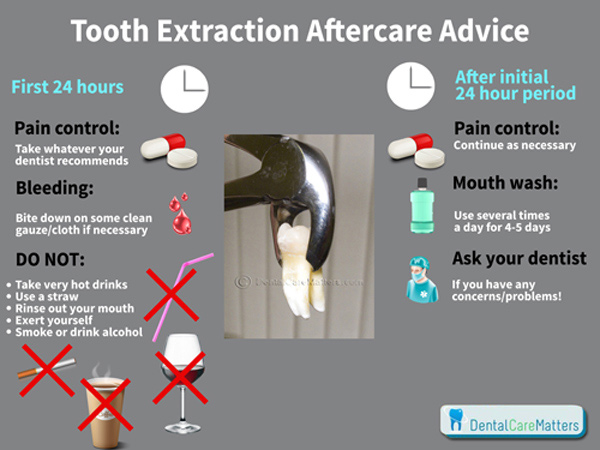Post-operative Care
INSTRUCTIONS AFTER YOUR WISDOM TEETH REMOVAL


Bleeding: A small amount of bleeding is normal after dental extractions. Place gauze over the extraction site and bite down to apply pressure for 30 minutes. If bleeding occurs within 10 seconds of removal of the gauze, replace it with new gauze for another 30 minutes. The above measures stop most bleeding. However, if profuse bleeding does recur, replace the gauze packs over the surgical sites for an additional 30 minutes. If bleeding persists, you can also wrap a lightly wet black tea bag in gauze and place it over the surgical sites while biting down gently holding pressure for 30 minutes. If bleeding still does not stop, contact the doctor at the above phone number.
Swelling, Stiffness, Bruising: Swelling is a normal process of healing and will gradually increase in the next 2 to 3 days after surgery. It will gradually decrease over the next 1 to 2 weeks. You can apply a bag of ice or bag of frozen vegetables such as peas over your cheeks for 20 minutes on and 20 minutes off for the first 24 hours after surgery to help decrease swelling. After that, you should no longer apply ice but you can apply heat. After the first day, to decrease swelling faster, please massage the face, apply warm compress and rinse with salt water. Sleep with extra pillows to keep your head elevated to help decrease swelling. Jaw stiffness and soreness may occur for several days and should return to normal after 1-2 weeks. You can also minimize the stiffness by exercising the jaw, opening the mouth as widely as possible several times each hour 2-3 days after surgery. You may experience some cheek bruising which will resolve over 1-2 weeks.
Pain Relief: Unless otherwise directed, it is critical that you take your pain medication as soon as possible after surgery before the local anesthesia wears off. Continue to take these medications on a SCHEDULED basis for 1 week and not when you are in pain. Eating small meals with medications may help to decrease nausea or stomach irritation.
There are normally three pain medications prescribed after extractions:
- Ibuprofen 600mg: Take 1 tab every 8 hours. Alternate with Acetaminophen every 4 hours.
- Acetaminophen 325mg (aka Tylenol): Take 2 tabs every 8 hours. Alternate with Ibuprofen every 4 hours. Do not exceed 4000mg of Acetaminophen in a 24 hour period.
- Amoxicillin 500mg: Take 1 tab 3 times a day until completed. If you are allergic to penicillin please take the alternate antibiotics as directed.
Activity: No strenuous physical activity for 1 week to include no lifting heavy weights and no running.
Sinus Precaution: If upper posterior molars or wisdom teeth were extracted, do not blow your nose for 1 week. Wiping your nose is preferred. Also, if you have to sneeze, do not cover your nose and mouth but let your sneeze out. Blowing your nose or covering your nose and mouth when sneezing can worsen potential sinus openings after upper molar extractions. Other precautions include no swimming underwater, no holding your breath, no playing wind instruments, or any activity that can cause changes in sinus pressure.
Oral Hygiene: Gentle brushing may be resumed the day of surgery being careful around the surgical sites. All rinsing should be done gently for 1 week after surgery. You can also gently rinse with warm salt-water (a teaspoon of salt to a glass of warm water) 3 to 4 times per day to help clean your mouth and decrease swelling. Do not use commercial mouthwash for 1 week. If the doctor placed sutures (stitches), avoid disturbing them. Most will dissolve and fall off in the next 1-2 weeks.
Smoking, Spitting, Drinking through a straw: Do not smoke, vape, spit, or drink through a straw during the first week after surgery. These actions may cause breakdown of the clot (dry socket) and increase post-surgical discomfort.
Diet: Clear fluids should be taken within an hour after surgery. You can have beverages such as apple juice, milkshakes, broth, water, etc. A high fluid intake is recommenced in the first two days to prevent nausea and dehydration. Avoid alcoholic beverages. Be careful eating prior to the local anesthetic wearing off as you may bite your tongue or the insides of your cheeks. Eat a soft diet such as mashed potatoes, eggs, yogurt, noodles, oatmeal, overcooked vegetables, and ground meats. Advance to a normal diet as tolerated over the next several days.
Follow-up appointments: Unless instructed to do so, most surgeries do not require a follow up appointment. Feel free to contact the dental clinic with any questions or concerns not answered within these instructions.
Precautions for ALL patients: Call the doctor if any of the following occur.
- Increasing pain after the first 3-4 days that is UNRELIEVED by prescribed pain medications.
- Unexplained increase in facial swelling 3 days AFTER your surgery
- Signs and symptoms of infection such as nausea, vomiting, fever, chills, foul mouth odor unrelieved by normal oral hygiene, or persistent discharge from the surgical wounds.
- Significant bleeding not controlled by following the above instructions. (Oozing may occur up to 24 hours).
- Experience a measured fever of 101.5 degrees or higher.
- Numbness to lower lip or chin after lower wisdom tooth extraction
For urgent concerns such as difficulty breathing, difficulty swallowing, brisk bleeding or sudden swelling of the face, mouth or neck please seek emergency care at nearest Emergency Department or call 911.
*** Females Only: taking antibiotics may cause your birth control to be ineffective. Please use an alternative birth control method if prescribed antibiotics. ***
recovery recommendations to your chain of command.
We will typically recommend 2 days of Sick in Quarters (SIQ) and 5 days of Limited Duty (LD) for two extractions; 3 days of SIQ and 7 days of LD for three or more extractions. Also we recommend no strenuous physical activity, no prolonged standing > 45mins, lifting > 25 lbs, operating heavy machinary, handling weapons and watch standing during your complete recovery phase. You will be discharged with signed post operative recommendations to give to your chain of command.
